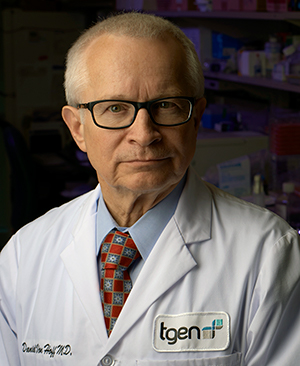In honor of his wife who passed away from pancreatic cancer, tech entrepreneur Emmet Stephenson and his daughter Tessa Stephenson Brand are donating $150 million to City of Hope. The majority of the donation will be used to establish an annual $1 million Stephenson Prize, which will be granted to one researcher or team from any institution globally to advance pancreatic cancer research, as well as a research symposium.
The $150 million donation marks the largest in the cancer center’s history. Toni Stephenson, who was treated at City of Hope, survived lymphoma and passed away from pancreatic cancer in 2020.
“We went to kindergarten together, and she was a lifetime friend. We’d been married 53 years when she died,” Emmet Stephenson told Endpoints News ahead of the announcement. “She was a gentle, kind, smart, hard-working, beautiful lady, and someone I miss every day, and someone that didn’t deserve to get pancreatic cancer — not that anybody does.”
The annual $1 million research grant will be one of the largest privately funded scientific awards for individual investigators in the US, according to City of Hope. The Stephenson Prize will be given out starting in 2025, and the winner of the grant will be announced each year via an annual pancreatic research symposium.
For comparison, the Nobel Prize was nearly $1 million last year.
 Robert Stone
Robert StoneOutside of the annual research prize, $13 million from the donation will fund the creation of a pancreatic biorepository to boost understanding of the biology of the disease and also aid research in developing ways to detect the disease early.
And $15 million is dedicated to clinical research in pancreatic cancer led by City of Hope and providing additional investment for the Toni Stephenson Lymphoma Center, which was created from a $10 million donation from the Stephensons in 2014.
Part of the $15 million includes investment into clinical studies of a form of immunotherapy called tumor-infiltrating lymphocytes as well as CAR-T cell therapy.
“It really is about that disruption of the status quo to realize the mission of fighting cancer — and having less bureaucracy, less red tape, and really a focus on speed and collaboration and bringing others into the fight,” City of Hope CEO Robert Stone told Endpoints in a joint interview.
Emmet Stephenson is also a board member of the Beckman Research Institute at City of Hope, and the Stephensons have previously gifted more than $11 million to the cancer center.
Pancreatic cancer is one of the deadliest cancers, with a five-year survival rate of 13%, according to the American Cancer Society.
But Daniel Von Hoff, distinguished professor at the Translational Genomics Research Institute, which is part of City of Hope, notes that strides have been made in the past two decades, such as a stent to open up blockages, though they may be underappreciated.
 Daniel Von Hoff
Daniel Von Hoff“I think there’s more hope now than there’s been in the past, really,” Von Hoff said.
Potential new therapeutics, while still in the early stages of testing, are also showing progress. Earlier this year, Redwood City, CA-based Revolution Medicines disclosed promising trial results of a targeted drug for a mutation found in the majority of pancreatic cancers and said it plans to initiate a Phase 3 study in metastatic pancreatic cancer this year.
“The awareness and the funding that went into breast cancer and other diseases made the field move forward,” Von Hoff said. “We all know that scientists need support. Clinical trials need support. Pancreas has been left on the sidelines for a long time because it’s been a very tough tumor, and it wasn’t as common as it is today.
“There’s no paucity of ideas,” Von Hoff said. “We’ve figured out a lot of these things to do, and the message has to be for people with pancreatic cancer: ‘Let’s give it a try.’”